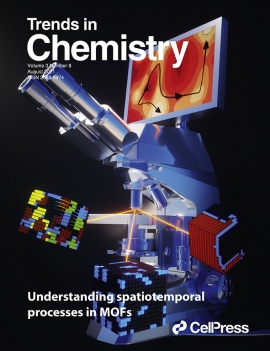
Abstract
Metal–organic frameworks (MOFs) are hybrid materials constructed from metal clusters linked by organic linkers, which can be engineered for target functional applications in, for example, catalysis, sensing, and storage. The dynamic response of MOFs on external stimuli can be tuned by spatial heterogeneities such as defects and crystal size as well as by operating conditions such as temperature, pressure, moisture, and external fields. Modeling the spatiotemporal evolution of MOFs under operating conditions and at length and time scales comparable with experimental observations is extremely challenging. Herein, we give a status on the modeling of spatiotemporal processes in MOFs under working conditions and reflect on how modeling can be reconciled with in situ spectroscopy measurements.
